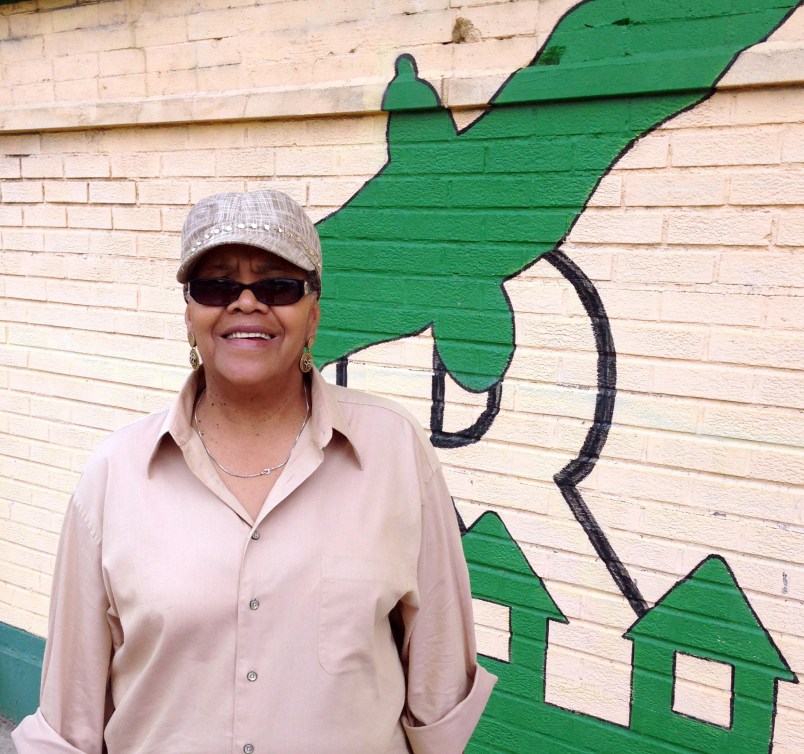DETROIT (AP) — Toni McIlwain believes that as a candidate for president, Donald Trump has a right to go anywhere he wants. But, she says, it takes a lot of nerve for him to visit Detroit.
Many black people here, she says, are still stung by the Republican presidential nominee’s visit to Michigan last month, when he went before a mostly white audience and declared, “You live in your poverty, your schools are no good, you have no jobs, 58 percent of your youth is unemployed.” He asked, rhetorically, what blacks had to lose by voting for him instead of Democrat Hillary Clinton.
“People picked up on” Trump saying “you’re all just crap,” said McIlwain, who for years ran a community center that offered education and drug prevention programs in one of Detroit’s most distressed neighborhoods.
“He generalized the total black community. How dare you talk to us like that and talk about us like that?” she said.
Trump is going to Detroit to make what appears to be a late attempt to woo black voters roughly two months before the general election. Unlike his usual campaign stops where he confidently addressed mostly white crowds that supported him and his plans for the country, Trump’s visit will be more intimate.
He’ll attend a service Saturday at an African-American church, but is expected to address the congregation with only a brief greeting. He is also scheduled to record a private interview with the church’s media mogul pastor, Bishop Wayne T. Jackson, and take some kind of tour with his former rival, Detroit native Dr. Ben Carson.
Carson, who has been advising Trump’s campaign, told The Associated Press that the trip would serve as an opportunity for the GOP nominee to see first-hand the challenges residents face as he refines his policy plans.
“It always makes much more of an impression, I think, when you see things first-hand. It makes a much bigger impact,” Carson said, adding that he hoped the visit would also leave the people Trump meets with a better sense of the candidate, who tends to be far less caustic in smaller settings than he appears on stage.
But the risky nature of the visit was underscored by what appeared to be unusually cautious planning by the Trump campaign.
On Thursday, The New York Times published what it said was a script of pre-approved questions Trump would be asked in his interview with Jackson, along with prepared answers.
Jackson told CNN on Friday that he “didn’t see anything wrong” with clearing his questions with the campaign and hadn’t offered softballs. Trump’s intention was to meet and speak with local residents while he’s in town “because he’s been criticized,” Jackson said, “for preaching to African-Americans from a backdrop of white people.”
Chances are a larger crowd of black voters will be outside the church protesting Trump’s presence in the city.
Detroit Mayor Mike Duggan and Democratic Rep. Brenda Lawrence are expected to speak against Trump’s candidacy on Saturday morning outside Great Faith Ministries International.
Another group of clergy also is planning a separate protest rally Saturday outside the church.
For Trump, courting black voters is a challenge. Most polls show his support among black voters is in the low single digits. Many blacks view some of his campaign rhetoric as insulting, and racist.
“Donald Trump does not mean any black people any good,” said Crystal Jackson, who has owned the C-Spot barbershop in northwest Detroit for the past seven years.
Jackson, who is not related to Bishop Jackson, said Trump’s campaign trail commentary about black lives is a pure illustration that “he has no clue” about blacks, the middle class or the poor.
“He’s already told us what he thinks of us,” Jackson said. “So, I think this election is extremely important. We have to get out and vote.”
If Trump truly wanted to have a dialogue with blacks in Detroit and hear about their concerns, he would have “arranged an opportunity for people to speak” with him, said the Rev. Horace Sheffield, one of several prominent pastors, labor leaders and elected officials planning a silent march Saturday morning to Bishop Jackson’s church.
“That’s why we’re marching down the street silently — because he doesn’t want to hear our voice,” Sheffield said. “We’re ignored. We’re invisible. We don’t count. And we’re not going to be used at the last minute.”
Detroit is about 80 percent black, and many are struggling. Nearly 40 percent of residents are impoverished, compared with about 15 percent of Americans overall. Detroit’s median household income is just over $26,000 — not even half the median for the nation, according to the census.
The city’s unemployment rate has dropped, but is still among the highest in the nation. And public school students have lagged behind their peers on statewide standardized tests.
Trump was received warmly Friday by a group of African-American business, civic and religious leaders during a roundtable discussion in Philadelphia. But others, like Ryan Boyer of the city’s Labor District Council, rebuked him, saying Trump “has no prescription to help inner-city America.”
In Detroit, that’s how Donna Lewis, 59, feels.
“You don’t invite the devil into your house,” Lewis said. “He’s a racist. He can’t help nobody. I don’t think he has enough ability to run the country.”
Lewis also believes Saturday’s visit shows Trump’s desperation as election day draws closer and he needs the black vote.
“He left us out and he wants to make up for that,” she said. “But it’s a little too late.”
___
Associated Press writer Jill Colvin in Philadelphia contributed to this report.
Copyright 2016 The Associated Press. All rights reserved. This material may not be published, broadcast, rewritten or redistributed.



